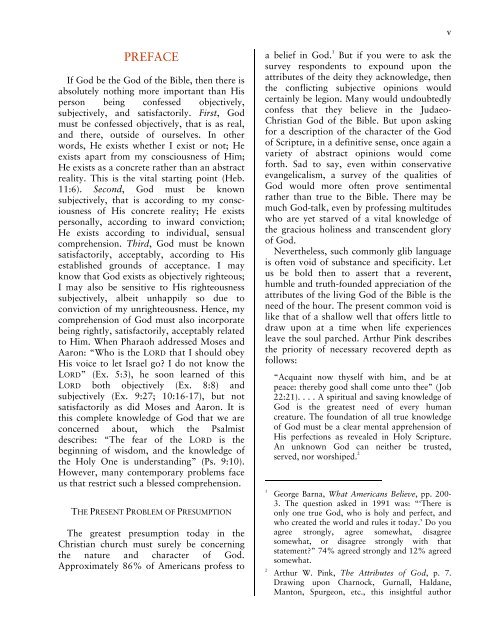that I should obey Him? - Future Israel Ministries
that I should obey Him? - Future Israel Ministries
that I should obey Him? - Future Israel Ministries
You also want an ePaper? Increase the reach of your titles
YUMPU automatically turns print PDFs into web optimized ePapers that Google loves.
PREFACE<br />
If God be the God of the Bible, then there is<br />
absolutely nothing more important than His<br />
person being confessed objectively,<br />
subjectively, and satisfactorily. First, God<br />
must be confessed objectively, <strong>that</strong> is as real,<br />
and there, outside of ourselves. In other<br />
words, He exists whether I exist or not; He<br />
exists apart from my consciousness of <strong>Him</strong>;<br />
He exists as a concrete rather than an abstract<br />
reality. This is the vital starting point (Heb.<br />
11:6). Second, God must be known<br />
subjectively, <strong>that</strong> is according to my consciousness<br />
of His concrete reality; He exists<br />
personally, according to inward conviction;<br />
He exists according to individual, sensual<br />
comprehension. Third, God must be known<br />
satisfactorily, acceptably, according to His<br />
established grounds of acceptance. I may<br />
know <strong>that</strong> God exists as objectively righteous;<br />
I may also be sensitive to His righteousness<br />
subjectively, albeit unhappily so due to<br />
conviction of my unrighteousness. Hence, my<br />
comprehension of God must also incorporate<br />
being rightly, satisfactorily, acceptably related<br />
to <strong>Him</strong>. When Pharaoh addressed Moses and<br />
Aaron: “Who is the LORD <strong>that</strong> I <strong>should</strong> <strong>obey</strong><br />
His voice to let <strong>Israel</strong> go? I do not know the<br />
LORD” (Ex. 5:3), he soon learned of this<br />
LORD both objectively (Ex. 8:8) and<br />
subjectively (Ex. 9:27; 10:16-17), but not<br />
satisfactorily as did Moses and Aaron. It is<br />
this complete knowledge of God <strong>that</strong> we are<br />
concerned about, which the Psalmist<br />
describes: “The fear of the LORD is the<br />
beginning of wisdom, and the knowledge of<br />
the Holy One is understanding” (Ps. 9:10).<br />
However, many contemporary problems face<br />
us <strong>that</strong> restrict such a blessed comprehension.<br />
THE PRESENT PROBLEM OF PRESUMPTION<br />
The greatest presumption today in the<br />
Christian church must surely be concerning<br />
the nature and character of God.<br />
Approximately 86% of Americans profess to<br />
a belief in God. 1 But if you were to ask the<br />
survey respondents to expound upon the<br />
attributes of the deity they acknowledge, then<br />
the conflicting subjective opinions would<br />
certainly be legion. Many would undoubtedly<br />
confess <strong>that</strong> they believe in the Judaeo-<br />
Christian God of the Bible. But upon asking<br />
for a description of the character of the God<br />
of Scripture, in a definitive sense, once again a<br />
variety of abstract opinions would come<br />
forth. Sad to say, even within conservative<br />
evangelicalism, a survey of the qualities of<br />
God would more often prove sentimental<br />
rather than true to the Bible. There may be<br />
much God-talk, even by professing multitudes<br />
who are yet starved of a vital knowledge of<br />
the gracious holiness and transcendent glory<br />
of God.<br />
Nevertheless, such commonly glib language<br />
is often void of substance and specificity. Let<br />
us be bold then to assert <strong>that</strong> a reverent,<br />
humble and truth-founded appreciation of the<br />
attributes of the living God of the Bible is the<br />
need of the hour. The present common void is<br />
like <strong>that</strong> of a shallow well <strong>that</strong> offers little to<br />
draw upon at a time when life experiences<br />
leave the soul parched. Arthur Pink describes<br />
the priority of necessary recovered depth as<br />
follows:<br />
“Acquaint now thyself with him, and be at<br />
peace: thereby good shall come unto thee” (Job<br />
22:21). . . . A spiritual and saving knowledge of<br />
God is the greatest need of every human<br />
creature. The foundation of all true knowledge<br />
of God must be a clear mental apprehension of<br />
His perfections as revealed in Holy Scripture.<br />
An unknown God can neither be trusted,<br />
served, nor worshiped. 2<br />
1<br />
George Barna, What Americans Believe, pp. 200-<br />
3. The question asked in 1991 was: “‘There is<br />
only one true God, who is holy and perfect, and<br />
who created the world and rules it today.’ Do you<br />
agree strongly, agree somewhat, disagree<br />
somewhat, or disagree strongly with <strong>that</strong><br />
statement?” 74% agreed strongly and 12% agreed<br />
somewhat.<br />
2<br />
Arthur W. Pink, The Attributes of God, p. 7.<br />
Drawing upon Charnock, Gurnall, Haldane,<br />
Manton, Spurgeon, etc., this insightful author<br />
v


